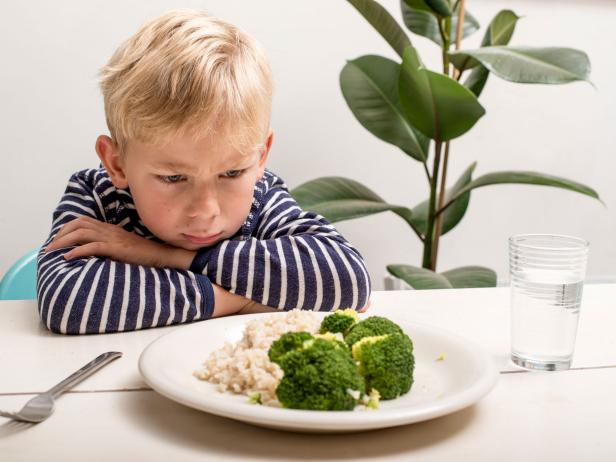How to Talk to Your Kids About Food and Nutrition
We asked two nutritionists and a psychologist for their best advice on how to talk to your kids about food in a healthy way.

katiafonti/Getty Images
If there’s one thing many parents agree on, it’s that one of our most important roles is to feed our kids healthy food. What that is might look different to different families, but the desire to nourish our children is something we all share.
But what about talking to our kids about food? This is something even the most thoughtful and well-meaning of us might not consider as much, but actually can have an enormous effect on our childrens’ relationship to food and overall well-being as they grow up.
About 24 million Americans will have an eating disorder at some point in their lives, according to the National Association of Anorexia Nervosa and Associated Disorders. Social media use and the pandemic have contributed to a rise in disordered eating, and people of color are less likely to be offered help or guidance by medical practitioners.
Beyond disordered eating is the stress and cost of diet culture, reportedly a $255 billion market in 2021 expected to rise to more than $377 billion by 2026. All of this focus on weight and dieting can lead to some really unhealthy — and just unpleasant — outcomes for our children. So how can we set them up to enjoy food, to nourish themselves well, and to generally have a good relationship with food? We asked three experts to share important do's and don’ts for talking to kids about food.
Take the value judgments out of food and eating.
“We tend to put things into buckets, thinking that food is either good or bad,” says clinical psychologist Dr. Lynn Saladino, Psy.D. “Talking to kids about food in a balanced way is important, looking at food as more of a gray scale, rather than in black and white terms.”
Once a type of food is characterized as “bad” or forbidden, research shows kids end up wanting it more.
Part of a balanced approach to food is not monitoring them quite so much. “If we really want to encourage our children to eat multiple types of food, we can't create a hierarchy around food as their adults and caregivers," says Maya Feller, MS, RD, CDN, author of The Southern Comfort Food Diabetes Cookbook. "Sometimes we say things like, ‘If you have your x, you can have your y.’ Kids are pretty good at measuring their internal hunger and satiety mechanisms when we don’t push them."
Also, trying to convince kids to eat certain foods solely because they’re good for them is a losing battle. “Trying to sell kids on the fact that that’s the reason they should be eating it — because it’s healthy, period — doesn’t translate well," says Dana White, MS, RD, ATC, author of The Healthy Vegan Air Fryer Cookbook. "If you can make the conversation more about the food than about the concept that they have to eat it because it’s good for them, you’ll tend to be more successful.”
You can point to the sweetness of a carrot, or the way their favorite chicken dish smells as it’s cooking, or ask them what kind of salad dressing is their favorite and make it with them, for example.
Another aspect of balanced communication with kids around food is avoiding the habit of seeing food as a means to an end, as a collection of specific nutrients or a certain amount of calories. This can take the pleasure out of eating, and cause too much focus on numbers.
"When we start counting, it can become kind of an obsession,” says White.
Having a balanced approach to food also means embracing the joy in food, and acknowledging to kids that we eat certain foods simply because they’re part of our cultural tradition or for pure enjoyment, having nothing to do with health, or weight, or any other outcome.

patat/Getty Images
Do not fight with kids about food.
Feller points to feeding expert Ellyn Satter’s strategy, which calls for parents and caregivers to decide what, where and when eating takes place, while children choose whether and how much to eat. When parents try to exert control over the responsibilities that belong to the children, conflict arises. Though it can be hard to allow kids to have that autonomy, it’s necessary.
“Most parents at one stage or another have had a child they would say is a picky eater or was argumentative about food,” White says. “The worst thing you can do is play into that. It can be very frustrating and it can take a lot of restraint on the part of the parent to not fight about it. But fighting about it never really gets anywhere. And fighting usually is going to perpetuate a negative relationship with food or with the whole meal experience, which is what you definitely don’t want.”
Along with avoiding fights, giving kids different levels of autonomy at different stages is one of the factors that will help them have a good relationship with food as they get older, Feller notes. With younger children, you can get their input by asking them what they want for lunch and giving them a few choices. For older children, who may be buying lunch at school or out, you can talk to them about what they’re doing that day, and then offer some gentle guidance. For example, if your daughter has a soccer game after school, you can ask her what foods will be available at lunch and talk through which ones will help her perform better and have more energy on the pitch. After that, the decision is hers.
Another way to give children a feeling of ownership and responsibility over what they eat is to ask them to choose some of the foods you buy; for example, when you’re making a shopping list, each child could choose a fruit they like. Or, when you’re meal planning, you can give everyone in the family an opportunity to choose one dinner each week.
Another habit to avoid: Using food as a reward. This common habit, ”If you’re good, we’ll get ice cream,” can undermine parents in two ways. For one thing, it’s sending a mixed message. If you want to teach your kids that healthy food is good and has rewards in itself, but then you offer foods you usually downplay as a reward for desirable behavior, that can be confusing to a child. Also, when certain foods are withheld and then offered as a reward, it creates a sense of urgency and scarcity, which may cause kids to eat more or even indulge when they don’t really want the food, just because it’s available.

Nitat Termmee/Getty Images
Encourage curiosity and exploration.
Another way to avoid conflict, pressure and shame around food is to treat each situation with curiosity. This is something that parents and kids can both do. “We aren’t the same person every day,” Dr. Saladino says. “Some days we want to eat certain foods, and other days we may want different foods. You can encourage your kids to understand that sometimes your body may be asking for different things at different times.” So rather concluding that your child doesn’t like a certain food because he refuses it once, encourage him to be curious about whether he truly doesn’t like that food, or perhaps he just doesn’t want it that day.
Also, if your child is going through a stage where they’re refusing a lot of foods, as frustrating as that can be, “try to get curious about that, rather than shutting it down,” Dr. Saladino says. “Ask some questions about why they don’t want it. Make some room for that.” Acknowledge that they’re refusing a food, calmly ask them why, then let it go. Try that food again another day, without forcing it.
Manage your own relationship with food.
One really important way to ensure that our kids have a healthy relationship with food is to work on our own attitudes and beliefs, and be mindful of what we’re doing and saying in front of them. “One of the most important things parents can do is lead by example,” White says. “If you have a parent that’s consistently crash dieting or yoyo dieting, that has a huge impact on a developing brain who’s trying to figure out how to eat. I’ve also seen this go terribly wrong, where parents try to project their own diets onto their kids for the sake of it being ‘healthy,’ but not realizing that it’s not establishing a healthy relationship with food.”
Many of the same principles for talking to kids about food can apply to us: Not labeling foods “good” or “bad,” approaching our feelings about food with curiosity instead of judgment,and not forbidding any foods because of their perceived impact on weight, for example.
Make social media a topic of open conversation.
“The influence and the impact that tweens and older kids have from social inputs, particularly these days, is incredibly high,” Dr. Saladino says. “The second they have a phone in their hands, they are being bombarded with messages about weight and looks, what to eat and what not to eat.”
Given that parents only have so much control over what kids see on their devices, it’s important to talk with them about what they’re seeing and hearing, and to make sure kids feel safe asking you questions about their experiences online, she adds. Some parents may choose to monitor what their kids are seeing, others might not do that, but can ask children about what they’re seeing. “Knowing what your kids are exposed to, particularly so that you can discuss what they’re seeing with them, could be very healthy, especially if you’re able to have a constructive, non-judgmental conversation about it,” she says, adding that boundaries around privacy must be established so kids know how much to expect.
Related Links:

































